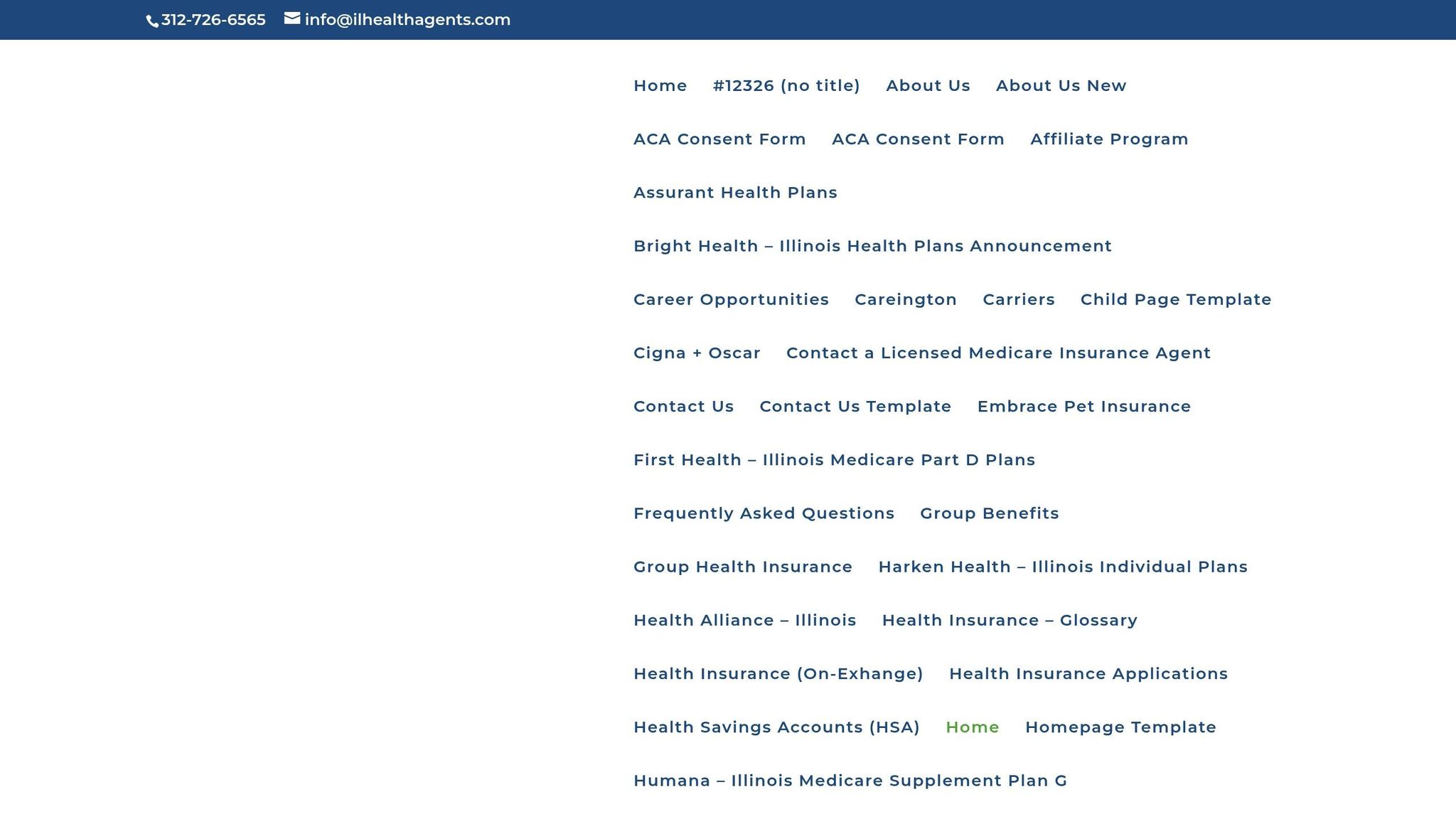Medicare has specific enrollment periods for signing up or changing your coverage. Missing the right window can lead to penalties or delays in coverage. Here’s a quick breakdown of the key Medicare enrollment periods:
- General Enrollment Period (GEP): For those who missed their Initial Enrollment Period (IEP). Runs from Jan 1 – Mar 31, but coverage starts July 1. Late penalties apply.
- Initial Enrollment Period (IEP): Your first chance to enroll. It lasts 7 months around your 65th birthday.
- Annual Enrollment Period (AEP): From Oct 15 – Dec 7, you can make changes to your Medicare plans for the next year.
- Special Enrollment Period (SEP): For life events like moving or losing employer coverage; timing depends on the event.
Quick Comparison
| Enrollment Period | Timing | Best For | Key Considerations |
|---|---|---|---|
| GEP | Jan 1 – Mar 31 | Missed IEP | Coverage delay until July; late penalties |
| IEP | 7 months around age 65 | First-time Medicare enrollment | No penalties if enrolled on time |
| AEP | Oct 15 – Dec 7 | Adjusting existing plans | Changes take effect Jan 1 |
| SEP | Varies by event | Life changes like moving | Flexible timing based on qualifying event |
If you’re unsure which period applies to you, consult a Medicare expert to avoid penalties or coverage gaps.
Every Medicare Enrollment Period Explained!
What is the General Enrollment Period (GEP)?
The General Enrollment Period (GEP) is a backup option for people who missed signing up for Medicare Part B during their Initial Enrollment Period. It runs from January 1 to March 31 each year and provides another opportunity to enroll. However, keep in mind that coverage won’t start until July 1.
When Should You Use the GEP?
The GEP is your go-to option if:
- You didn’t sign up for Medicare Part B during your Initial Enrollment Period.
- You don’t qualify for a Special Enrollment Period.
In short, if you missed your initial chance to enroll, the GEP is there to help.
What Are the Costs and Limits of the GEP?
Enrolling through the GEP comes with a downside: a late enrollment penalty. This penalty increases your monthly premiums, so it’s important to weigh your options. Also, during the GEP, you can only sign up for Original Medicare (Parts A and B). If you’re interested in Medicare Advantage or a Part D prescription drug plan, you’ll need to wait for their specific enrollment periods.
Other Medicare Enrollment Periods
Medicare provides various enrollment periods designed to fit different situations, so understanding these options is key to making informed decisions about your coverage.
First-Time Enrollment (IEP)
The Initial Enrollment Period (IEP) is your first chance to sign up for Medicare. This window typically surrounds your 65th birthday and lasts for seven months: three months before your birthday month, the month of your birthday, and three months after. Signing up during this time helps you avoid potential late enrollment penalties that could apply if you delay.
Annual Plan Adjustments (AEP)
The Annual Enrollment Period (AEP) happens every year from October 15 to December 7. During this time, you can make changes to your Medicare coverage. For example, you might switch from Original Medicare to a Medicare Advantage plan, move between Medicare Advantage plans, or update your Medicare Part D prescription drug coverage. Any changes you make during AEP will typically take effect on January 1 of the next year.
Special Circumstances (SEP)
A Special Enrollment Period (SEP) allows you to adjust your Medicare coverage outside the usual enrollment windows if you experience certain life events. These events could include moving to a new area, losing employer-sponsored coverage, or changes in your Medicaid eligibility. SEPs offer flexibility to ensure your coverage aligns with your current needs.
sbb-itb-a729c26
GEP vs. Other Enrollment Periods
The General Enrollment Period (GEP) stands out from other Medicare enrollment periods due to its specific timing and the financial implications it imposes on beneficiaries.
Timing and Qualification Rules
Here’s how the timing and qualification criteria differ between enrollment periods. The GEP occurs annually from January 1 to March 31, with coverage beginning the month after enrollment is completed.
| Enrollment Period | Timing | Who Qualifies |
|---|---|---|
| GEP | Jan 1 – Mar 31 annually | Individuals who missed the IEP and don’t qualify for the SEP |
| SEP | Varies by life event | Individuals experiencing specific life events |
Cost and Coverage Differences
The GEP is often associated with higher financial penalties, which can significantly impact long-term costs for beneficiaries. For Medicare Part B, the penalty adds 10% of the standard premium for every full year of delayed enrollment. This penalty remains in place for life unless specific exceptions apply. Similarly, for premium-based Medicare Part A, the penalty is also 10% but is calculated for twice the number of delayed years.
For example, delaying Part B enrollment by three years results in a 30% lifetime increase in your monthly premium.
Coverage options also vary across enrollment periods. During the GEP, individuals can only sign up for Original Medicare (Parts A and B). While it’s possible to add supplemental coverage later, timing restrictions may lead to temporary gaps in coverage. In contrast, other enrollment periods, like the SEP, often allow for more immediate access to additional Medicare options, such as Medicare Advantage plans and prescription drug coverage.
For those in Illinois navigating Medicare enrollment, consulting with knowledgeable professionals can make a significant difference. They can help clarify timing rules, minimize penalties, and ensure continuous coverage without unnecessary gaps.
Medicare Enrollment in Illinois
Navigating Medicare enrollment in Illinois comes with its own set of challenges, largely shaped by state-specific rules. The Illinois Department of Insurance plays a key role in overseeing the enrollment process, setting guidelines that influence coverage choices. Thankfully, local experts are available to help simplify these complexities and guide you toward making informed decisions.
Support from Illinois Health Agents

Illinois Health Agents works with leading insurance carriers to offer dependable Medicare plans tailored to Illinois residents. With licensed agents serving 46 states, they provide personalized assistance to help you through every step of the enrollment process.
| Enrollment Assistance | Benefits |
|---|---|
| Strategic Enrollment Planning | Helps reduce gaps in coverage and avoid penalties |
| Local Plan Expertise | Guidance on Illinois-specific Medicare options and requirements |
| Smooth Coverage Transitions | Ensures seamless changes between plans and programs |
| Tailored Support | Offers individual evaluations of enrollment timing and plan options |
"We’re here to help you and your family navigate the healthcare system from beginning to end." – Illinois Health Agents
Independent agents also assess whether a Special Enrollment Period (SEP) might be a better fit for your situation compared to waiting for the General Enrollment Period (GEP). This expertise is especially helpful when factoring in Illinois-specific rules and deadlines that can impact your coverage.
Choosing Medicare coverage in Illinois requires careful thought about both immediate needs and future implications. Professional guidance can help you sidestep common mistakes – like coverage delays or unexpected costs – while ensuring your decisions align with federal and state regulations.
Next Steps: Selecting Your Enrollment Period
Choosing the right Medicare enrollment period depends on your current circumstances and what you anticipate needing in the future. Here’s a quick breakdown of the main options:
| Enrollment Period | Best For | Key Considerations |
|---|---|---|
| GEP | Missed Initial Enrollment | Coverage delays and possible penalties |
| IEP | First-time eligibility | Flexible options without penalties |
| AEP | Annual plan changes | Limited to October 15 – December 7 |
| SEP | Qualifying life events | Requires meeting specific criteria |
Taking the time to understand these periods is essential. Missteps can result in delayed coverage or higher premiums down the line.
If you’re feeling unsure about where to start, expert advice can make the process much easier. For example, Illinois Health Agents, a trusted resource helping over 15,000 individuals and businesses in Illinois every year, offers personalized support by:
- Pinpointing your exact eligibility windows
- Explaining qualifying events for Special Enrollment Periods
- Evaluating potential costs and penalties
- Crafting a timeline tailored to your needs
To avoid last-minute stress, begin exploring your options at least three months before you plan to enroll. This gives you plenty of time to gather necessary documents and make well-informed choices.
FAQs
What happens if I miss my Medicare Initial Enrollment Period, and how can the General Enrollment Period help me get coverage?
If you miss your Medicare Initial Enrollment Period (IEP), you could face delays in getting coverage and might have to pay late enrollment penalties. The IEP is a seven-month window that begins three months before your 65th birthday, includes your birthday month, and extends three months after. Missing this timeframe means you’ll need to wait for the next opportunity to enroll.
The General Enrollment Period (GEP), held every year from January 1 to March 31, allows you to sign up for Medicare Part A and/or Part B if you didn’t enroll during your IEP and aren’t eligible for a Special Enrollment Period. Keep in mind, though, that coverage won’t start until July 1, and you may still face penalties depending on how long you’ve been without coverage. To avoid these setbacks, it’s best to enroll as soon as you’re eligible.
For tailored advice on Medicare enrollment and plan options, you can contact Illinois Health Agents. They can guide you through your choices and help you find the coverage that works best for your situation.
What are Medicare late enrollment penalties, and how can you avoid or reduce them?
Medicare late enrollment penalties can lead to extra costs tacked onto your premiums if you delay signing up for certain parts of Medicare when you’re first eligible. Take Part B, for instance – your monthly premium jumps by 10% for each 12-month period you were eligible but didn’t enroll. What’s more, these penalties typically stick with you for life, making timely enrollment crucial.
To steer clear of these penalties, be sure to sign up during your Initial Enrollment Period (IEP). This window opens three months before your 65th birthday, includes your birthday month, and closes three months after. If you miss this opportunity, you can still enroll during the General Enrollment Period (GEP), which runs from January 1 to March 31. However, penalties may apply. On the bright side, if you have qualifying coverage, like through an employer, you might qualify for a Special Enrollment Period (SEP) to avoid these added costs.
For tailored advice, you can connect with local experts like Illinois Health Agents. They can guide you through the Medicare enrollment process and help you explore ways to keep your costs in check.
What should I consider when deciding between Medicare’s General Enrollment Period and a Special Enrollment Period?
When weighing Medicare’s General Enrollment Period (GEP) against a Special Enrollment Period (SEP), it’s crucial to grasp their differences in timing, eligibility, and purpose.
The GEP happens every year from January 1 to March 31. It’s meant for people who missed their Initial Enrollment Period and don’t meet the criteria for a SEP. If you enroll during the GEP, your coverage will start on July 1, but you might face late enrollment penalties.
On the other hand, a SEP is available under specific circumstances, like losing employer-sponsored coverage or relocating to a different area. SEPs let you sign up outside the usual enrollment windows, often without penalties. Plus, coverage under a SEP usually begins sooner than it would with the GEP.
If you’re uncertain about which enrollment period fits your situation, reaching out to a Medicare expert, such as the team at Illinois Health Agents, can help you make the right choice for your needs.




0 Comments